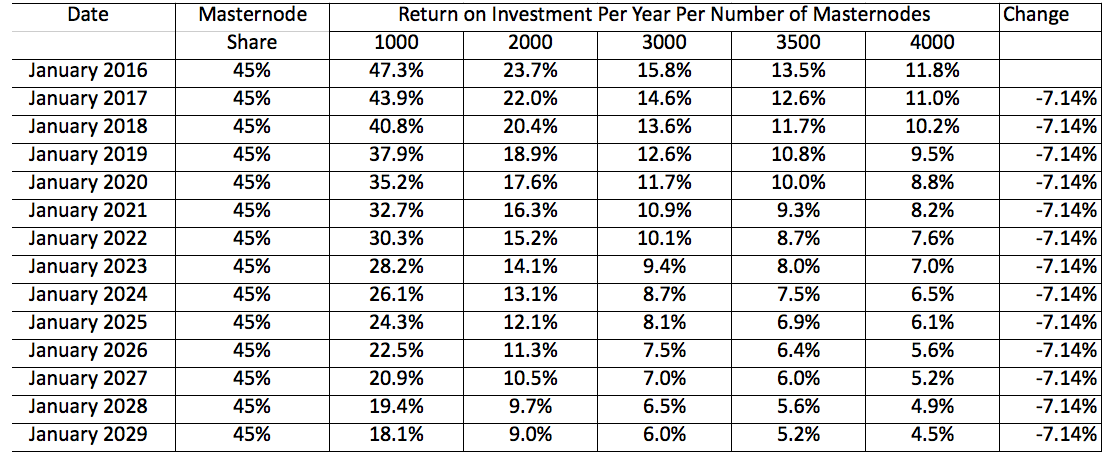Masternodes are computers that run a dash wallet and make decisions, such as locking transactions with InstantSend, coordinate mixing of coins, and voting on budget funding. Masternodes are required to have 1000 Dash collateral, a dedicated IP address, and be able to run 24 hours a day without a more than a 1 hr connection loss. Masternodes get paid 45% of the block reward on every block, which is distributed to masternodes one at a time. Typically, around 2 dash is paid to each masternode every 7 days.
Masternodes enable the following services:
- InstantSend (instant transactions). In contrast, Bitcoin takes about 10 minutes to confirm a payment.
- PrivateSend (anonymous transactions). In contrast, Bitcoin transactions are totally public and traceable. Only the identity of the addresses is anonymous.
- Decentralised Governance (masternodes govern, while the blockchain funds development). In contrast, Bitcoin is controlled by a few big miners and funded by 3rd party centralised institutions with self interests.
- Dash Evolution a decentralized payment processor (think a decentralized Paypal).
Masternodes are also given voting rights on proposals. Each masternode has 1 vote and this vote can be used on budget proposals or important decisions that affect Dash. For a complete list of current proposals please click here.
How much can I earn from hosting a Masternode?
Masternodes cost money and effort to host so they are paid a share of the block reward to incentivize them. With current masternode numbers and rewards masternodes earn approximately a 11% return on 1000 Dash for the year of 2016. This reward falls off in subsequent years but as the value of Dash is rising and the supply of Dash goes down, masternodes should still be sufficiently incentivized. This projection also doesn’t count the fees that masternodes earn whenever someone uses its services (InstantSend and PrivateSend).
Current statistics (average from top 5 exchanges, updated every 20 minutes):

What do I need to host a Masternode?
- 1000 Dash: Arguably the hardest part. Dash can be obtained from exchanges such as Bitfinex Poloniex, Bittrex and Shapeshift‘s service is also an excellent way. For the full list of places to obtain Dash click here.
- A server or a VPS installed with Linux: For the purposes of this guide we will be used Ubuntu 14.04 LTS. We recommend cheap VPSes such as from Vultr and DigitalOcean though any decent provider will do. Generally a low specced one will do. I use the 5 USD ones from Vultr and they work fine.
- A dedicated IP address: These usually come with the VPS/server.
- A little time: When I first got into masternodes, there were only a few guides around and did not cover all the scenarios. It took days for me to figure out the best ways to do everything. However, the process now takes a few minutes. Here are a few guides that I hope will make the process a lot easier.
If you can’t be bothered with setting up and maintaining your own and don’t mind paying a little extra, you can go with paid masternode hosters which will greatly simplify the process. A few good ones can be found here.
A Video Introduction to the Masternode Network
Incentivized Infrastructure and Masternodes
Why incentivize infrastructure and how do we do it? What is the masternode network?
Share this page with your friends
Popular choices
- Best Non Gamstop Casinos
- Non Aams Casino
- Casino Not On Gamstop
- UK Casinos Not On Gamstop
- Migliori Casino Non Aams
- UK Casinos Not On Gamstop
- Casino Sites Not On Gamstop
- Best Online Casinos
- Gambling Sites Not On Gamstop
- Slots Not On Gamstop
- Sites Not On Gamstop
- Non Gamstop Casino UK
- UK Betting Sites Not On Gamstop
- Online Casinos Canada
- オンラインカジノ ランキング
- Non Gamstop Casinos
- Casinos Sin Verificación
- UK Casino Sites
- Non Gamstop Casino Sites UK
- Meilleur Casino En Ligne Français
- Casino Not On Gamstop
- UK Casino Not On Gamstop
- UK Casinos Not On Gamstop
- Migliore Casino Non Aams
- Casino Online Non Aams
- Casino Sites Not On Gamstop
- Casino Online Migliori
- Casino En Ligne
- Meilleurs Sites De Paris Sportifs Belgique
- Nouveau Casino Belge En Ligne
- Visa Casino
- Casino En Ligne Fiable
- ブック メーカー 日本 おすすめ
- Migliori Casino Non Aams
- Casino Senza Invio Documenti
- Site Casino En Ligne
- Meilleur Casino En Ligne
- Migliori Casino Non Aams
- Siti Non AAMS





